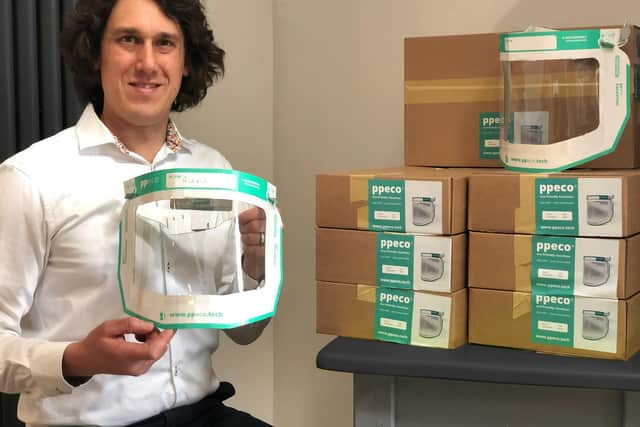Preston business invents plastic-free, one-of-a-kind PPE
and live on Freeview channel 276
PPECO, headed by industrial product designer Richard Taylor, teamed up with the Allied Health Research Unit, the Innovation Clinic and the MedTech Solutions Group at the university to develop the visor.
It is entirely plastic-free, fully recyclable and fully biodegradable and is suitable for use by doctors, nurses and healthcare professionals as well as in care homes, hospitality and retail.
Advertisement
Hide AdAdvertisement
Hide AdDuring the first lockdown Richard’s GP wife couldn’t access the PPE she needed


Richard came up with the idea for the visor during lockdown last year when his wife, who is a GP, struggled to get access to the PPE she needed.
The visor has a paper-based headband and frame and the front is made from a wood-pulp based material. Not only is this environmentally friendly, but the wood-pulp material is fog resistant and can be cleaned.
In June last year the designer secured a grant from Innovate UK to help turn his idea for the visor into a reality.
Advertisement
Hide AdAdvertisement
Hide Ad“Getting a new product from concept through to market can normally take around 18 to 24 months but the PPECO FaceVisor has achieved this in just six months,” Richard said.
Richard turned to experts for help
After he received the grant, Richard turned to UCLan experts to help develop the project.
“Access to the academic expertise at UCLan has helped us in a number of different ways and has made a huge difference, especially as we are a small team trying to complete an ambitious task in a short space of time,” Richard said.
Professor of Biomechanics Jim Richards led a team from the UCLan Allied Health Research Unit to test and develop Richard’s visor.
Advertisement
Hide AdAdvertisement
Hide AdThe team assessed the product’s structural integrity, safety, protection and usability through UCLan’s Innovation Clinic.
“We’re delighted to work with PPECO on a product that is very much needed by a multitude of industries,” professor Richards said.
“Our visor is the only one made of corrugated cardboard and this 3D design makes it very robust, which is needed by front-line healthcare workers.”
A one-of-a-kind visor
UCLan’s Innovation Clinic research suggests that there is no other product in the UK with the same eco-credentials and robustness as the PPECO FaceVisor.
Advertisement
Hide AdAdvertisement
Hide AdThe visor has already been used within several NHS Trusts and in other industries such as manufacturing, education and retail.
More than 400 visors have been sent to key workers such as nurses who need to wear visors at work every day. They are expected to send feedback to The Allied Health Research Unit so the product can be improved.
“We’re operating in a rapidly-changing marketplace so it’s important we can show that we have conducted independent feedback regarding the efficacy of the product from the university and key workers,” said professor Richards.
A mountain of single-use plastic
As a result of the pandemic, PPE waste has become a mounting issue.
Advertisement
Hide AdAdvertisement
Hide AdAround 2.3 billion items of single-use PPE were sent to health and social care services in England between February and July last year. This is the same amount that was distributed throughout the whole of 2019.
The PPECO FaceVisor could be one solution. It is fully biodegradable, folds flat for transportation and has a carbon footprint between 70-85% less than plastic visors.
Dr David Taylor, PPECO Supply Chain Director, said: “Another feature that makes this product special is its low carbon footprint of supply.
“The visors come flat-packed and 50 visors can fit into a small box, which is not only important to keep transport costs down but also means reduced storage space both in warehouses and in user premises.”
Visors could help developing countries
Advertisement
Hide AdAdvertisement
Hide AdThis feature will also make it easier to ship the visor to developing countries which may eventually be able to produce the visors themselves.
“The FaceVisors are currently being produced in the UK by a major manufacturer capable of producing 100,000 units a day,” said Dr Taylor, “What’s more, the manufacturing process can be easily replicated in other countries and in due course, we will be exploring international markets.
“It also means developing countries can produce this element of PPE on home soil without the need for imports.”
More information about the PPECO FaceVisor can be found at this website.